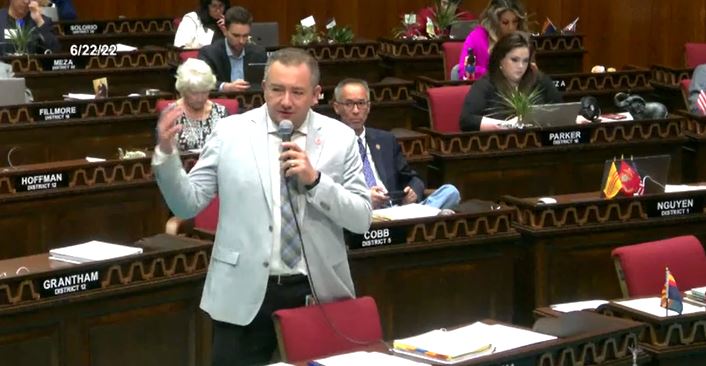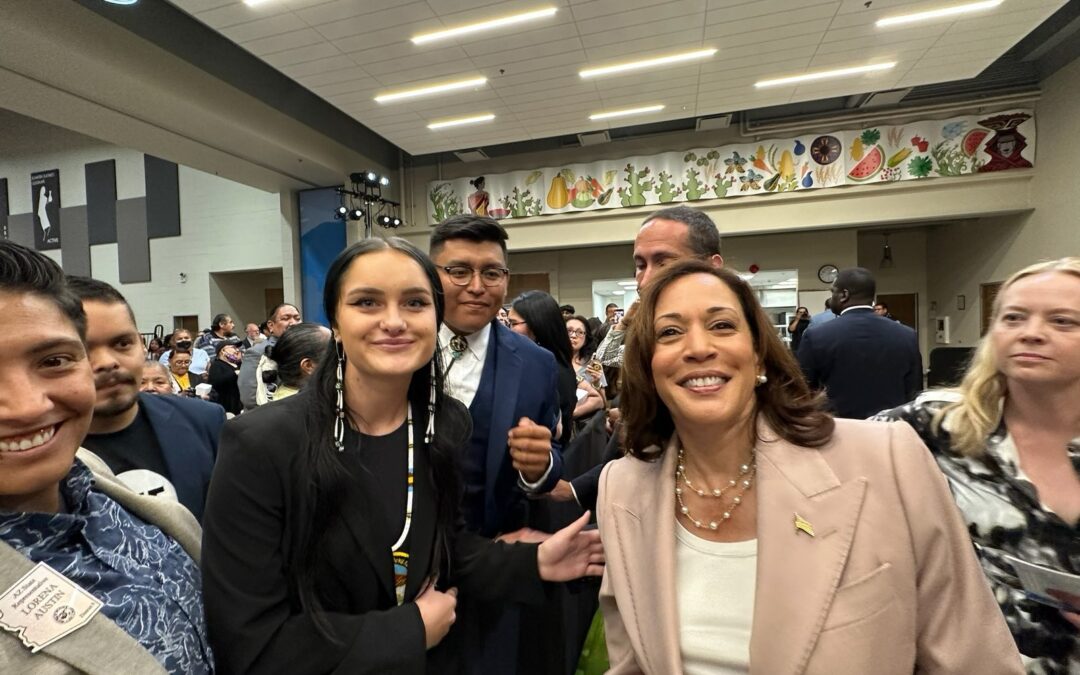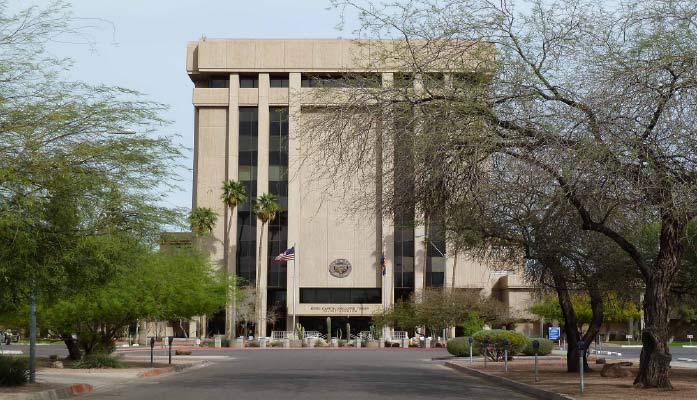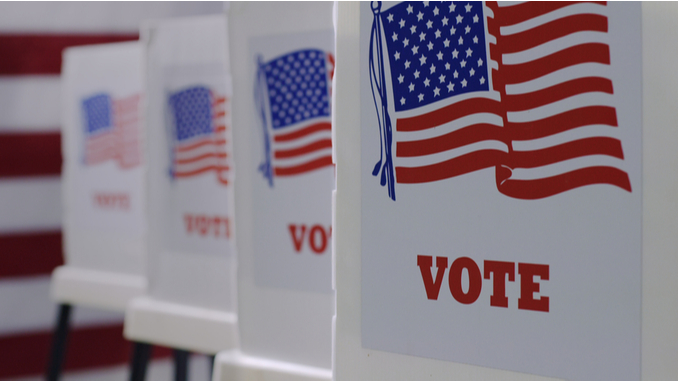
by Corinne Murdock | Jul 7, 2023 | News
By Corinne Murdock |
Governor Katie Hobbs has rejected a request made by 12 of Arizona’s 15 county attorneys to rescind her executive order taking away their authority to enforce abortion law. The county attorneys submitted a letter to the governor on Monday. The county attorneys issued a Friday deadline for her response.
The governor issued an executive order last month stripping county attorneys of their ability to enforce abortion law. Hobbs bestowed that responsibility onto Attorney General Kris Mayes, who has already said she plans on ignoring the law.
Abortion is banned after 15 weeks’ gestation in Arizona.
The letter pointed out that Hobbs’ action undermined the duty and discretion of the county attorneys to enforce the law.
“The governor’s office should not interfere with the discretion of prosecutors in fulfilling their duties as elected officials,” stated the letter. “Whether this was the intended purpose, the result [of the executive order] is an unnecessary and unjustified impingement on the duties and obligations of elected county attorneys in Arizona.”
The county attorneys also contested that Hobbs had usurped authority that didn’t belong to her.
“This executive order results in an exercise of authority not vested in the governor’s office,” read the letter. “It is a substantial overreach to suggest the governor may strip away prosecutorial discretion from local, elected officials.”
READ THE LETTER HERE
Hobbs’ new communications director, Christian Slater, tweeted in response that Hobbs’ assuming control over the judiciary in an effort to undermine the current law was part of her putting “sanity over chaos.” Slater labeled those opposed to abortion as “extremists.”
“Governor Hobbs will continue to use her lawful executive authority to put sanity over chaos and protect everyday Arizonans from extremists who are threatening to prosecute women and doctors over reproductive healthcare,” wrote Slater.
Hobbs issued the executive order one day before the one-year anniversary of Dobbs v. Jackson Women’s Health Organization — the Supreme Court (SCOTUS) decision that overturned Roe v. Wade. Hobbs’ order revoked the authority of county attorneys to prosecute abortion-related cases, and passed that authority onto Mayes.
Hobbs called abortion a “fundamental right,” the existence of which she claimed was paramount to freedom.
“I signed an Executive Order protecting Arizonans’ reproductive freedom,” said Hobbs. “I will not allow extreme and out of touch politicians to get in the way of the fundamental rights of Arizonans.”
Corinne Murdock is a reporter for AZ Free News. Follow her latest on Twitter, or email tips to corinne@azfreenews.com.

by Corinne Murdock | Jul 7, 2023 | News
By Corinne Murdock |
Arizona House Speaker Ben Toma (R-LD27) told Gov. Katie Hobbs to rescind her executive order banning conversion therapy for minors.
In a letter sent on Monday, Toma advised Hobbs that the order was likely unconstitutional since it wasn’t enacted via the legislature. Toma further warned that the order could violate the Parent’s Bill of Rights as well as the Arizona Constitution.
“Although other states have enacted laws banning conversion therapy, those states have that policy choice through the legislative choice. Your executive order is an improper exercise of your authority,” stated Toma. “The far-reaching mandates of your executive order also threatens to violate the Parents’ Bill of Rights […] and Arizonans’ constitutional rights, including patients’ rights to freely speak with their therapists[.]”
Toma further criticized the governor for her definition of “conversion therapy,” which he asserted was “unprecedented, vague, unintelligible, and unenforceable.” The main reason for this, Toma asserted, was because Hobbs’ team came up with it themselves.
“[T]he executive order’s ban on ‘conversion therapy’ is a ban defined by your administration alone — bearing no resemblance to the laws of other states,” stated Toma. “State agencies directed to implement your executive order cannot even begin to understand what constituted a banned ‘conversion therapy.’”
In one of two executive orders related to LGBTQ+ issues last week, Hobbs banned state or federal resources to promote, support, or enable any conversion therapy. The governor defined conversion therapy as the following:
“‘Conversion therapy’ means any practice or treatment that seeks or purports to change an individual’s non-heteronormative sexual orientation or non-cisgender identity, including efforts to change behaviors or gender expression, under the false premise that homosexuality and gender-diverse identities are pathological. This does not include gender-affirming care.”
The states that banned conversion therapy through legislative statute are New Jersey, California, Oregon, Illinois, Vermont, New Mexico, Connecticut, Rhode Island, Nevada, Washington, Hawaii, Delaware, Maryland, New Hampshire, New York, Massachusetts, Colorado, Maine, Utah, Virginia, Michigan, Minnesota, North Carolina, Wisconsin, and Pennsylvania enacted conversion therapy bans via executive orders.
Federal courts in Florida have twice ruled against similar bans — in November 2020 in February — as unconstitutional under the First Amendment.
In her executive order, Hobbs cited general consensus from the American Medical Association, American Academy of Pediatrics, American Psychological Association, American Psychiatric Association, American Academy of Child and Adolescent Psychiatry, American Counselor Association, and the National Association of Social Workers that conversion therapy poses a danger to minors.
The governor also cited a duty to use taxpayer funds on fiscally sound, safe, credited, effective, and evidence-based practices.
The other executive order expanded state employee health care plans to cover gender transition surgery.
Corinne Murdock is a reporter for AZ Free News. Follow her latest on Twitter, or email tips to corinne@azfreenews.com.

by Corinne Murdock | Jul 7, 2023 | News
By Corinne Murdock |
Vice President Kamala Harris visited Arizona on Thursday to discuss special advantages her administration has given and plans to give to Native Americans.
The trip marked Harris’ first visit to Indian country, according to the Gila River Tribal Nation’s opening remarks during the event.
Harris called the tribal nation’s reliance on a federal assistance leasing program a “symbol of sovereignty.” The vice president further declared that the federal government retains responsibility to ensure tribal members are successful.
“President Biden and I also believe that we have a duty to address the deep disparities that persist across Indian country. Disparities that are the result, and truth must be spoken,” said Harris. “Disparities are the result of centuries of broken treaties, harmful assimilation policies, displacement, dispossession and violence,. We have a duty to ensure that all Native people have the opportunity to thrive.”
Harris further said it was the federal government’s responsibility to ensure economic opportunity and success to Native communities through home and small business loans, as well as lines of credit. The vice president cited their administration’s investment of over $500 million into Native American entrepreneurs and small business, and hundreds of millions into community banks.
Harris characterized the Native Americans as “stewards” of the environment for “millennia.”
This mass characterization conflicts with certain realities, especially in recent American history. Native Americans played a role in causing the near-extinction of buffalo with their hunting practices, which included driving mass herds of buffalo off cliffs or killing hundreds at a time just to harvest small parts, like tongues.
(A widespread claim blames professional hunters wishing to eradicate Native Americans for decimating the bison population in the 19th century; however, research shows that the near-extinction was caused by mass disease, triggered by the reduction of bisons’ natural population managers: humans.)
Consequently, Harris revealed that the federal government would invest billions into “climate-resilient infrastructure projects” led only by Native American individuals.
“In order to create enduring solutions to the climate crisis, we must then rely on the knowledge and the experience of Native communities,” said Harris.
Harris claimed that Native Americans’ voting rights remain in jeopardy, citing remarks made in a meeting with activist Allie Young and Secretary of the Interior Deb Haaland.
The pair alleged the threats concern the distance it takes to reach polling places, and the denial of tribal land IDs when voting. Harris called for two weeks of early voting, an increased number of dropboxes, and same-day automatic voter registration.
Harris also shared that the federal government is working to install voter registration sites in Indian Health Services locations.
The vice president also touched on the federal government’s internet infrastructure initiative. Native Americans receive a special deal on internet access through the Biden administration’s arrangement: up to $75 off per month, versus only $30 off for non-tribal households.
The Biden administration has consistently focused on equity-focused treatment of Native Americans in issuing federal funding. Last year, the administration awarded $261,000 for a regional study of 16 miles of a pedestrian and bicycle pathway, and nearly $25 million to the Colorado Indian River Tribes to reconstruct 10 miles of road.
Corinne Murdock is a reporter for AZ Free News. Follow her latest on Twitter, or email tips to corinne@azfreenews.com.

by Daniel Stefanski | Jul 6, 2023 | News
By Daniel Stefanski |
One of Arizona’s leading Republicans is seeking a meeting with the state’s chief executive over her recent actions over abortion.
Senate President Warren Petersen sent a letter to Democrat Governor Katie Hobbs, hoping to broker a meeting and a solution to the standoff the state finds itself in over consideration of her remaining nominations.
Petersen wrote, “I’m troubled by your recent administrative actions. My constituents and Senate colleagues are concerned by the slew of Executive Orders you have recently issued while we are in recess. These questionable actions and the role of your agency Directors, many of whom the Senate has yet to confirm, is worth discussion.”
The Senate President continued with his letter, requesting a meeting with the governor, stating, “While I believe it would have been productive for you to meet with my colleagues on the nominations committee who requested a meeting, I think a conversation between the two of us would be productive. Let’s see if we can find a way to move forward in a bipartisan manner that benefits all of Arizona.”
This plea from the east valley lawmaker follows a volley of reactions from both Republicans and Democrats after the governor’s Executive Order to “centralize all abortion-related prosecutions under the Attorney General to ensure differences in applications of the law by county attorneys do not restrict access to legal abortions.” Senator Jake Hoffman, the Chairman of the Committee on Director Nominations, announced that he was canceling the next hearing “with support of the Republican Majority serving on the committee to determine Hobbs’ future intentions to further act beyond her authority.”
The three Republican members of the committee – Hoffman, Sine Kerr, and T.J. Shope – requested a meeting with the Hobbs’ administration “to discuss any additional unlawful overreach (her) office intends to take requiring complicity from Executive Directors,” telling the governor that they have “grave concern that the direction (she) intends to provide to (her) nominees will not allow them to fulfill this obligation (of thoroughly and objectively evaluating nominees for their commitment to execute Arizona laws, rather than create new public policies that conflict with the constitutionally established separation of powers).”
Arizona Senate Democrats quickly pushed back on Hoffman’s revelation. Senate Democratic Caucus Chair Lela Alston issued a statement, writing, “Senator Jake Hoffman has once again shown his disregard for government and everyday Arizonans. By failing to schedule the confirmation hearings for the Governor’s nominees, he shows how ineffective and partisan the Republican party in Arizona truly is. I am disgusted by this move of extremism and call on his leadership to rectify his foolish actions.”
After a report circulated that this meeting was “not likely” to occur, Senator T.J. Shope tweeted, “Oh…so much for that Open Door Policy we’ve heard about over and over again. I guess Governor Hobbs would rather fight it out in an adversarial court setting as opposed to an adult conversation in an office setting.”
A Senate Republican Caucus spokesperson previously told AZ Free News that the chamber has received 21 director nominations from Hobbs, with 12 awaiting their confirmation hearings.
Just a day before the Senate President’s Letter to Governor Hobbs, his caucus tweeted, “Hobbs is setting a dangerous precedent by issuing illegal executive orders and attempting to seize power from county attorneys and the Legislature. Our Caucus is reviewing all legal remedies to ensure appropriate constitutional separation of powers.”
Daniel Stefanski is a reporter for AZ Free News. You can send him news tips using this link.

by Corinne Murdock | Jul 6, 2023 | News
By Corinne Murdock |
The $60 million promised by Gov. Katie Hobbs to house the homeless in this latest budget is now being used to house, feed, and provide resources to illegal immigrants as well.
Gov. Katie Hobbs hailed the funding as a means of affordable housing for “every Arizonan” — which now apparently includes illegal immigrants.
“With the Homeless Shelter and Services Fund and the historic $150 million deposit into Arizona’s Housing Trust Fund, we are making real progress toward ensuring affordable housing for every Arizonan,” said Hobbs.
$20 million of the $60 million was deployed immediately in early June through the Arizona Department of Housing (ADOH). The agency neglected to mention in its press release that illegal immigrants would also benefit from the millions.
The funds are dispersed through ADOH’s newly-established Homeless Shelter and Services (HSS) Fund. ADOH advised applicants that it would prioritize those who served those impacted by the court order for the city of Phoenix to clean up its mass homeless encampments in Freddy Brown v. City of Phoenix, the expiration of Title 42 which enabled the expedited expulsion of illegal immigrants, and the closure of sober living homes and residential facilities.
On Wednesday, the city councils for Scottsdale and Phoenix approved their portion of ADOH HHS funding. Unlike Scottsdale, Phoenix approved their funding without discussion.
The following received a cut of this recently-allocated $20 million:
- Phoenix: $13.3 million
- Tucson: $2.73 million
- Mesa: $1 million
- Scottsdale: $940,000
- Tempe: $929,000
- Flagstaff: $840,000
- Coconino County: $133,000
Apart from Phoenix and Scottsdale, the other city councils or boards have yet to discuss their awarding of funds during a regular meeting.
As part of their agreement to receive the ADOH funds, Scottsdale will take in the “overflow” of Phoenix’s homeless population displaced by the breakup of the mass homeless encampment known as “The Zone.”
Scottsdale will pay $500,000 to rent hotel rooms at McCormick Ranch, as well as issue $400,000 for supportive services and $40,000 for nutrition and all other “essential needs” for a year.
Up to 120 individuals will benefit from this arrangement. 30 percent of the rooms must go to homeless individuals from “The Zone” — Phoenix’s mass homeless encampment that the Maricopa County Superior Court ruled in May must be cleaned up.
Councilman Barry Graham, who voted against Scottsdale’s recent measure, expressed consternation that city leaders chose to prioritize outsiders over Scottsdale’s homeless population.
“I voted ‘no’ based on responses to my questions about vetting participants and community safety,” stated Graham. “Scottsdale residents are compassionate — however there are better ways to demonstrate compassion.”
Corinne Murdock is a reporter for AZ Free News. Follow her latest on Twitter, or email tips to corinne@azfreenews.com.

by Corinne Murdock | Jul 6, 2023 | News
By Corinne Murdock |
Arizona’s Latino voters may be more likely to vote Republican in the 2024 presidential election, based on the latest surveys of Latino voters.
This voter shift was noted in a recent focus group conducted in Arizona and Nevada among Latinos that were either fluent in English or Spanish. The research discovered that narratives of President Joe Biden’s economic failures, as pointed out by Republicans, had significant influence on the voters.
“[They were] often feeling as though they were constantly working hard just to make ends meet due to the high cost of living,” read the report.
When asked to rank issues based on importance, Latino voters far outranked the economy, pricing, and jobs above social issues like “protecting democracy,” abortion, climate, immigration, guns, school safety, and public safety.
78 percent of respondents also admitted that they weren’t aware of any specific accomplishments by President Joe Biden or Democrats that directly helped them. That’s compared with 67 percent of Black voters who couldn’t identify specific benefits from Biden or the Democratic majority in Congress.
Specifically, a majority of the Latino respondents said that Biden and his “Bidenomics” had done “nothing” for them — in both languages.
Additionally, the Latino respondents believed that crime and public safety were more important to them than the Democratic Party.
When asked which party they would support for the 2024 elections, more than double the respondents remained undecided. The remainder expressed slightly more support for the Democratic Party over the Republican Party.
However, when pressed to cast their potential vote between Biden and a GOP candidate, more Arizona Latino respondents chose the unnamed GOP candidate over Biden.
The voters also expressed distrust of former President Donald Trump and his supporters, who they blamed for their concerns of discrimination and hate.
The focus group was conducted through Valiente Action Fund, a project of the Democratic action group Way to Win.
Way to Win launched in 2017 following Trump’s victory, with the sole purpose of serving as a national donor network to defeat Republicans. The co-founders are Tory Gavito, Jenifer Fernandez Ancona, and Leah Hunt-Hendrix.
Gavito formerly served in various legal and activist capacities across Austin, Texas and Zacatecas, Mexico: first as a lawyer for the Equal Justice Center in the early 2000s, prior to becoming the legal director of Centro de los Derechos del Migrante in Mexico. Gavito then became an associate attorney at the Glenda Pittman & Associates law firm, before becoming the founding executive director for Texas Future Project.
Fernandez Ancona was a former vice president for the Women Donors Network, communications director for Citizen Engagement Laboratory, and senior advisor to progressive donors Steve Phillips and Susan Sandler, consultant to Democracy Alliance.
Hunt-Hendrix — granddaughter of oil tycoon H.L. Hunt and niece of Kansas City Chiefs founder Lamar Hunt — also co-founded progressive donor networks Solidaire and the Emergent Fund. Hunt-Hendrix also served as a senior advisor for the American Economic Liberties Project and was involved in the Occupy Wall Street movement. Hunt-Hendrix is not listed currently on Way to Win’s team page, though she lists herself as a co-chair of the organization on LinkedIn as of this report.
The organization spent $110 million in 2020 on key swing states to successfully deliver Democratic victories. Their targeted funding was especially impactful in Arizona and Georgia.
Way to Win’s primary funders have included George Soros’ Open Society Foundations and family, Stryker Corporation heiress Patricia Stryker, prominent D.C. consulting firm Arabella Advisors’ Sixteen Thirty (1630) Fund, and the Tides Foundation-backed One Arizona.
Corinne Murdock is a reporter for AZ Free News. Follow her latest on Twitter, or email tips to corinne@azfreenews.com.






